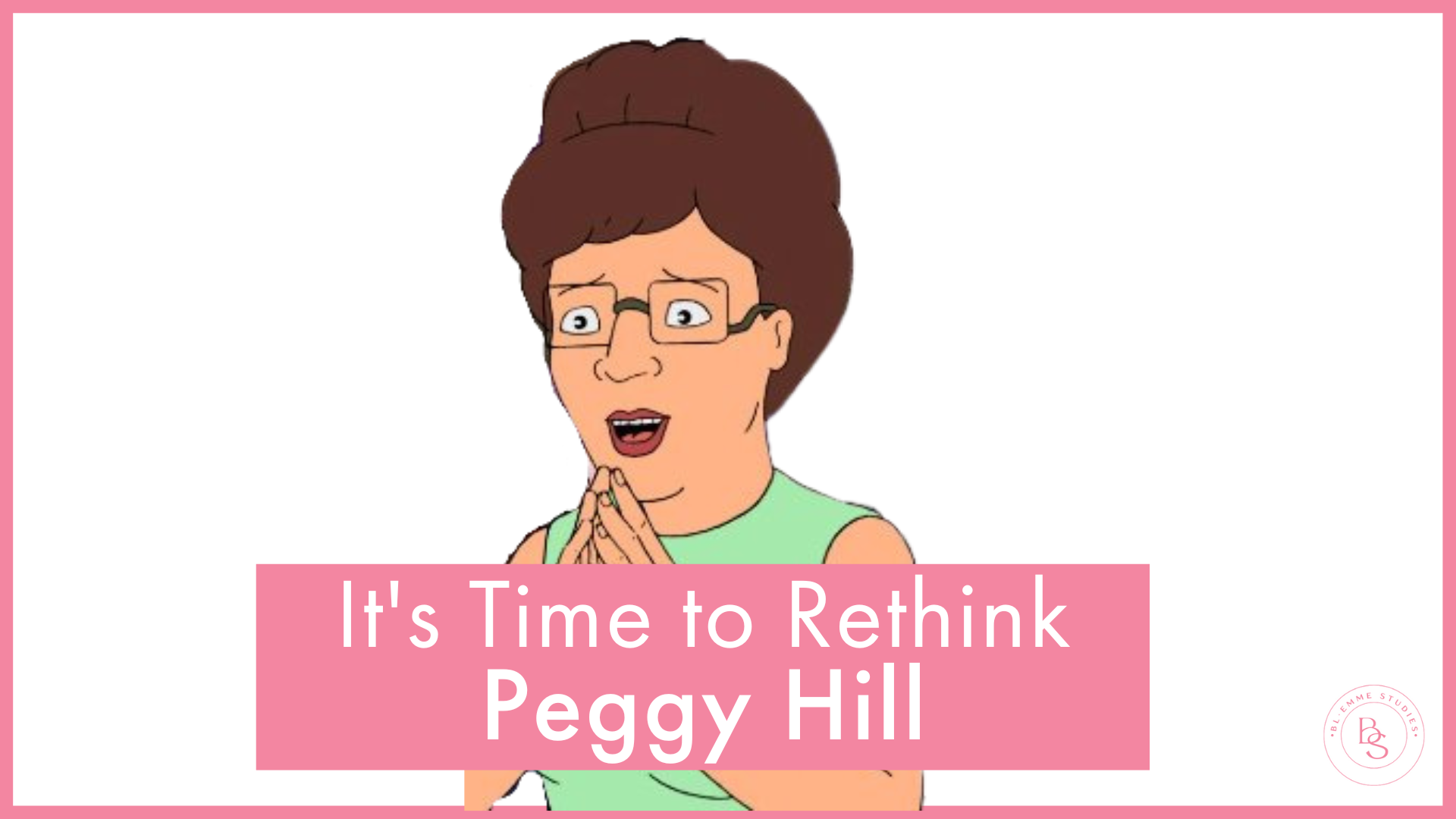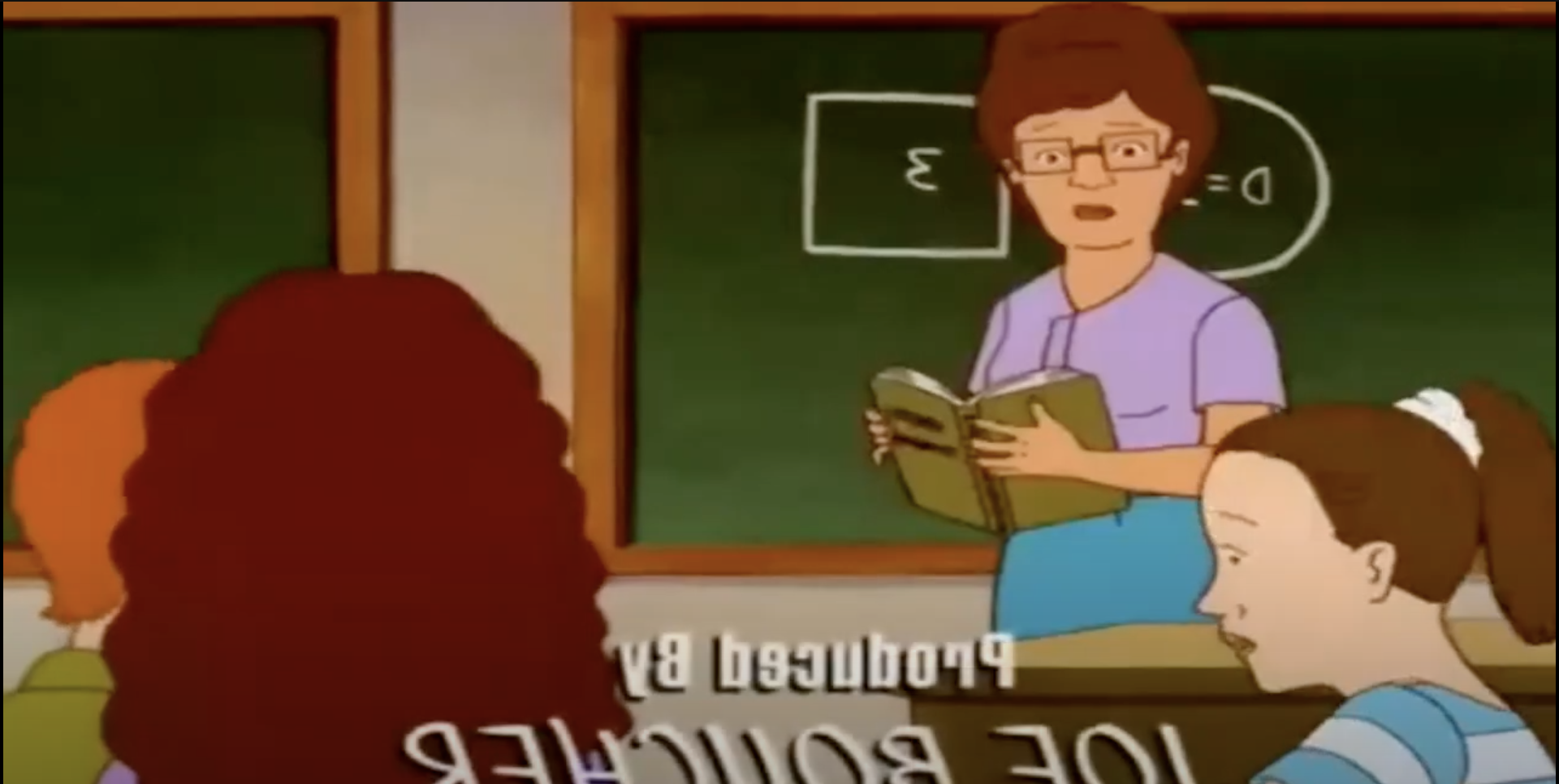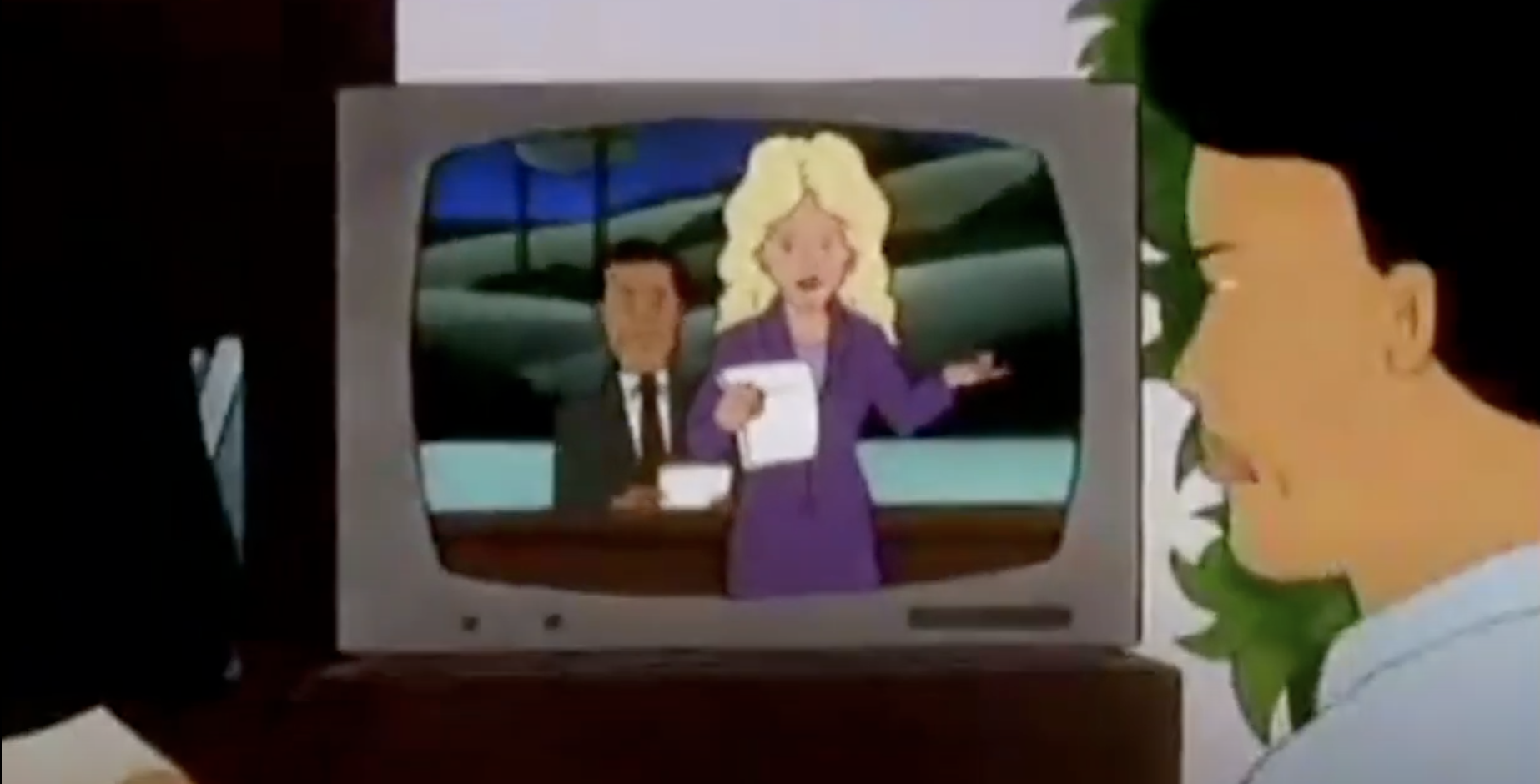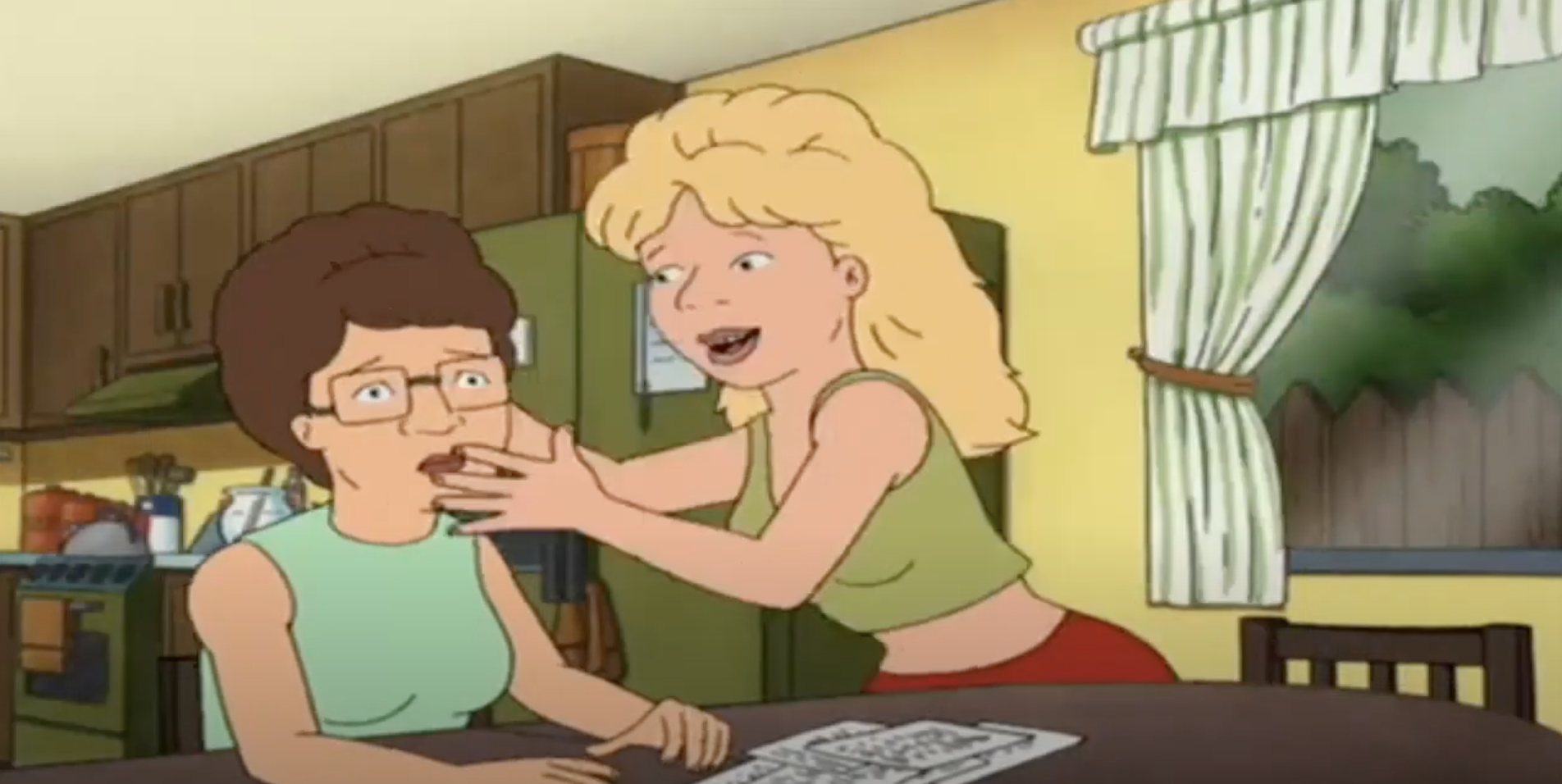It's Time to Take A Second Look at Peggy Hill
From “King of the Hill,” (FOX 1997-2009; Hulu, 2025-Present):
Peggy Hill: Well, a married woman, of course. Not just a wife but a partner. Definitely a mother. Someone who is distinguished by her brain size not her bra size.
It's time to take a second look at Peggy Hill, animated television's least-favorite narcissist and bad mom.
It's the year 2022 and Internet psychologists the world over have firmly established that Peggy Hill, wife of protagonist Hank Hill on Fox's animated sitcom "King of the Hill," exhibited narcissistic behaviors and engaged in some questionable parenting during the show's 13-season run.
Peggy, voiced amazingly and with so much depth by Kathy Najimy, is portrayed as a shrill substitute Spanish teacher with pretty obvious low self-esteem that masquerades as cocky over-confidence and a reeking need to be externally validated.
This often put her at odds with other characters on the show, not to mention routinely jeopardized her family's finances and well-being. She's kind of a terrible person and it's easy to hate her, which the Internet really, really, really does.
From “King of the Hill,” (FOX 1997-2009; Hulu, 2025-Present):
Student: You can’t show your work.
Peggy Hill: Of course I can. But if I have to waste all my time explaining number four to you, I will not have time to explain number five.
But while there have been lengthy and detailed arguments as to why Peggy was the “King of the Hill”’s most insufferable character (and she may very well have been), she wasn't the 'worst' character, morally, on the show—not by a long shot.
Her loose relationship with the truth and fragile ego placed her squarely in the "bad" wife, mom and teacher categories, often, but her wrongdoings aren't any more scandalous than the other character's. In fact, Peggy's chronic lying and obnoxiousness paled in comparison to the web of lies, unfaithfulness and trauma Nancy Hicks-Gribble, Peggy's neighbor and confidante, spun throughout the show.
Dale Gribble, Nancy's husband and Arlen's resident conspiracy theorist, was a literal menace to everyone he encountered and a running gag on the series was how he'd assumed the identity of a childhood classmate since the third grade—even using his social security number and health insurance.
And let's not even get started on the homophobic, emotionally repressed, and surely damaging ways Hank parented the pair's son, Bobby, or how he sometimes disregarded Peggy in a markedly gendered way, often with a staunch unwillingness to listen to her or try to meet her emotional needs.
What I'm saying is: Every character on this show was tipping the scale of good and evil. Every character had moments that painted them as "bad" parents or spouses or professionals.
But the character we as an audience were made to hate is Peggy.
With a "King of the Hill" reboot on the way and a cultural reimagining of the role of mothers buzzing in the zeitgeist, it's time to rethink Peggy Hill: substitute teacher, progressive mother, and—hot take—one of the more interesting portraits of white womanhood during the late nineties and early aughts. Here's why.
I. Peggy was likely mentally ill.
While many already made the case that Peggy had narcissistic personality disorder, there's also evidence that she might have suffered from other mental health issues, too.
First, narcissism. A narcissist's defining traits are typically grandiosity, a lack of empathy for other people, and a need for admiration. While Peggy did show plenty of empathy for her family, and a particular tenderness toward Luanne Platter, her niece, the other two traits could describe nearly every storyline Peggy had on the show.
There's a distinction between the disorder, and the term "narcissism," which, according to Psychology Today, "is a trait that ranges in degree from person to person," and that
"The term has become culturally entrenched, sometimes overused. Narcissism only becomes a disorder when it impairs a person’s daily life, through their relationships, sense of self, occupation, or legal standing."
Some of Peggy's stories point to how her inflated sense of self disrupts her relationships and career.
Chiefly, her penchant for being easily conned out of valuables when the con artist appeals to her supposed intelligence.
From “King of the Hill,” (FOX 1997-2009; Hulu, 2025-Present):
Hank Hill: Oh come on, Peggy, you've got an IQ of 170. You've said so lots of times.
Peggy Hill: Yes, but there could be a margin of error, especially when it's just my own estimate.
As shown in season six’s “The Substitute Spanish Prisoner,” where Peggy spends part of her and Hank's retirement fund on a fake Ph.D administered by an even more fraudulent Texas Intelligence Institute, or when she's convinced to let a sheisty anthropology professor dig up her lawn looking for Indigenous American artifacts.
Then, there are the multiple pyramid schemes Peggy winds up in — always reactively after she's had her ego bruised — and always convinced she's got the upper hand. Just the prospect of sitting a couple inches above her colleagues and eating steak at her boss' table was enough to potentially incur crippling debt and a near-lifetime of bondage to the Cozy Kitchen company.
From “King of the Hill,” (FOX 1997-2009; Hulu, 2025-Present):
Judy Barnes: That wasn’t a sample kit, Silly, that was your first inventory shipment.
Peggy Hill: Ah, well, potato potato.
Judy Barnes: No, potato, you owe us money. Lots of money.
Peggy Hill: You probably don't realize how threatening you're coming off even with a smile.
Judy Barnes: Peggy, bless your heart. I don't think you understand how deep you're in. I suggest you read your contract.
In these pyramid scheme episodes, too, Peggy is all too willing to put The Hill family's livelihood at risk as she searches for praise and validation.
But there are other moments, too.
A despondent Peggy sobbing into her hands, sometimes over what seemed to be thorny, deeply rooted wounds, like feeling unfeminine and inadequate around other women. More often, though, seemingly minor disappointments and setbacks were enough to dissolve this outwardly steely and confident woman to fits of tears, like when she thinks her garden gnome is stolen or when she's sacked from her job as Tom Landry Middle School's cheerleading coach (a gig she'd had for just a few weeks, as far as the audience could tell).
And there's the ultimate Peggy's insane and insufferable but, also, like seriously Peggy, girl, are you OK moment in season seven’s “Goodbye Normal Jeans,” when she becomes jealous and irrationally frustrated after Bobby proves to be a natural homemaker, cooking and sewing to Hank’s satisfaction.
But here’s the thing, more than any other character, save for poor Bill Dautreve, who is Hank's lonely, dejected, and seriously depressed childhood friend and neighbor, Peggy's insecurities and anxieties over her place in the world are played for laughs.
Her psychotic break is just another “Peggy personality flaw” since the show doesn't give much in the way of exploration for the ways that her upbringing or deep dissatisfaction with the way her life turned out might fuel these menacing behaviors.
This contrasts heavily with Hank, whose harsh treatment of Bobby is constantly excused by the funhouse mirror presence of his own domineering and never-satisfied father, Cotton. While we do meet Peggy's stern and withholding mother in the season 19 episode “A Rover Runs Through It."
From “King of the Hill,” (FOX 1997-2009; Hulu, 2025-Present):
Peggy Hill: Oh, Mom!
Maddy Platter: What?!
There is little mention of her before or after. There may be offhand references, but not enough to build a good portrait of their relationship beyond the fact that it's fraught and Peggy's mom is mean to her.
II: Was Peggy Really a bad Mom?
While we're talking about moms, Peggy isn't really a bad one. She is usually a doting and supportive parent to Bobby, and a nurturing and encouraging aunt to Luanne, who lives with the Hill family for a good chunk of the show. Even as we see her clumsy struggles with her own sense of self-worth—clearly influenced by an unhappy childhood—Peggy is generally open and receptive in her relationships with the young people in her life.
This is especially true when compared to two other mothers on Rainey Street: Minh Souphanousinphone, mom to Connie, and Nancy, mom to Joseph.
While we frequently see Nancy, the only working mother and breadwinner on the block, distracted and fussy when she's with Joseph, Peggy is generally attentive to Bobby and Luanne and it seems that she genuinely enjoys being a part of their lives.
Minh, is a stay-at-home mom who's shown as being most interested in social climbing and tending to her rose garden. Her interest in Connie seems to be primarily focused on grooming her to become a stereotypical Model Minority, forcing her to spend all of her free time studying, volunteering, practicing music, or competing in after-school clubs. Minh rarely addresses Connie unless she is giving a direction or correction.
Even though Peggy's screentime with her child far outweighs the other mothers, it's a fair assertion that she seems to be the most interested in parenting out of the three mothers on the show.
We also know that Peggy desperately wanted to become a mother—a process that was lengthened by Hank's famously narrow urethra and his unwillingness to ever undress at the doctor's office to be treated for his infertility. The stars aligned and Bobby was conceived but he was their miracle child and they accepted that he would be an only child. This might partially explain why Peggy is so gracious and eager to nurture Luanne as more of a mother than an aunt.
Unlike Hank, whose own prone-to-depression mother and cruel, womanizing father make frequent appearances across multiple seasons to show how Hank became so narrow-minded and repressed, Peggy doesn't enjoy the same kind of character building. We're left to form some sort of profile of how she came to womanhood and motherhood only through brief flashbacks, offhand comments and the one Platter family episode.
The show takes a pretty dim view of Peggy as a mother, though. Taken together, "King of the Hill" spends a lot of time on moments when Peggy is just being awful.
Take the aforementioned"Goodbye Normal Jeans." The entire third act is just Peggy in a bathrobe on Thanksgiving doing progressively terrible things until she winds up at her hairdresser who she presumed was gay and an outcast on the holiday, as felt that she was. And sobs with grief at the sight of his attractive wife and bouncing baby, before screaming:
From “King of the Hill,” (FOX 1997-2009; Hulu, 2025-Present):
Peggy Hill: You have a family that loves you?
The first act of the same episode featured a string of misogynist and borderline homophobic comments from Hank to Bobby, expressing the elder Hill's complete disgust with his son taking Home Ec at school. Peggy handles the comments in stride and even contradicts the outmoded thinking, telling Bobby that:
From “King of the Hill,” (FOX 1997-2009; Hulu, 2025-Present):
Peggy Hill: Oh please. There's no rule that says only women can do housework and only men can have careers.
On the other hand, Hank was often wildly wrong, overreactive, and completely unable to accept that Bobby isn't the hyper-masculine, strong and silent son of his dreams. In those instances, the show usually framed Hank's behaviors as a slightly overreaching, maybe a little too stern lesson that Bobby ultimately needed.
For example, in the season eight episode "Reborn to Be Wild," Hank sends his son to a youth Bible study because he thinks Bobby is being negatively influenced by rock music. The Bible study group turns out to be just as rock n' roll as Bobby's secular music, with members praising Jesus while skateboarding and tattooing testimonies into their skin.
Hank is predictably horrified, grounds Bobby and drags him offstage of a Christian rock concert. At home, Hank produces a box of childhood toys that Bobby used to love, explaining that as people age, trends go in and out and he doesn't want God to be just another trend that Bobby discards as an adult.
Yeah, but no.
If Hank's parenting were given the Peggy treatment—which it totally should have in this episode—Hank would have ended up with egg on his face and an overt message to the audience that he would never be satisfied with Bobby because of his narrow view of masculinity. But since the parent in question wasn't Peggy, the storyline got the “Father Knows Best” treatment.
Although both Peggy and Hank have their fair share of honorable and incredibly terrible moments as parents, "King of the Hill" was intentional about framing these narratives so that audiences would relate to and root for Hank while pitying and loathing Peggy.
Despite this , or maybe even because of it , Peggy still stands out as charismatic, memorable and just super interesting. Like so many television Karens and bad moms of the decades following “King of the Hill”'s 1997 debut, her screen appearances crackled with fiery suppression: Rage? Sexuality? Disappointment? Some heady mix of all three?
By creating a villainous foil to dopey Hank, the show also created a very interesting woman character.
Which brings us to the last reason Peggy Hill deserves a second look. She was punished by the show because she represented patriarchy's biggest nuisance: an unf*ckable woman.
III. Peggy Was Punished for Being Unf*ckable
Although Peggy made constant references to her own attractiveness and desirability, the show made it clear that the greater community didn't see her the same way. She was constantly described as a man or man-like. Cotton, Hank's dad, once successfully quieted Hank by saying that:
From “King of the Hill,” (FOX 1997-2009; Hulu, 2025-Present):
Cotton Hill: You can't control your wife and she's only half the man I am.
Even Bill's uncomfortable infatuation with Peggy carried undertones of how the show portrayed her as masculine. We know from at least two occasions that Bill's fantasy women are actually men. In season nine's "Arlen City Bomber," he lusts after a woman on Peggy and Luanne's roller derby team, saying:
From “King of the Hill,” (FOX 1997-2009; Hulu, 2025-Present):
Bill Dautreve: That woman's perfect: She's beautiful and could be a father figure.
Then there were the ways that Peggy was juxtaposed with Nancy, who was seen as a great beauty.
Peggy is a frumpy brunette who wore her hair up in a schoolmarm style, no matter the occasion. We learned that her old-fashioned square glasses were actually inspired by a much older woman, the Spanish teacher at Arlen High who Peggy admired and wanted to emulate.
Nancy, on the other hand, was shown as a blonde bombshell with a curvy figure that her husband, Dale, made constant references to. Her job as the local weather girl was entirely looks based and she'd formerly competed in beauty pageants. Her everyday clothing was more stylish and set off by heels —shoes that Peggy had a hard time finding in her size.
This contrast is made plain in the season six episode "Sug Night." When Peggy invites The Hills over to The Gribbles for a soak in their new hot tub, her swim cap and nose plug are cartoonishly unsexy next to Nancy's sultry bikini.
In personality, too, outwardly compliant and pleasant Nancy, is the human manifestation of catching flies with honey over vinegar. Peggy's defiance, independence and refusal to play the role of the happy housewife is the exact opposite.
Even though the inner workings of Peggy's marriage are much more traditional than Nancy's. Dale is frequently referred to as a do-nothing husband whose unsuccessful business doesn't actually support the family financially.
Even in these moments when we see how Nancy plays a more traditionally masculine role in her family as the breadwinner, she is in constant service to Dale's ego and fragile facade of masculinity—something Peggy does not seem interested in.
The summation of this is Peggy is allowed to be openly humiliated and mocked throughout the show, implicitly and explicitly. She is described as not being good enough for her not-very-successful or attractive husband Hank because in a patriarchy being the lowest possible iteration of a successful man makes you deserving of a pliant trophy wife like Nancy.
In the 25 years since the show debuted, pop culture and societal depictions of women have changed a lot.
Viewed through a 21st-century lens, Peggy still isn't the best, but she certainly isn't the worst and it's easy to see how much of the vitriol lobbed at her through the years was fueled by the show's opinion of her and the toxic culture to which her character belonged.
What do you think? Are we all too hard on Peggy or did she really have it coming? Let me know in the comments!
Also, be sure to like this video if you'd like to see more video essays on pop culture.

















